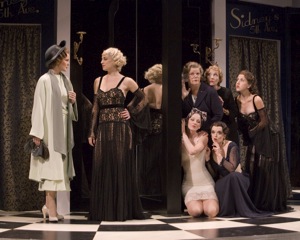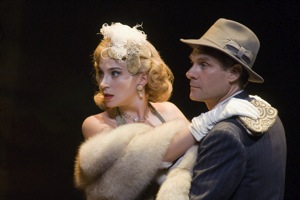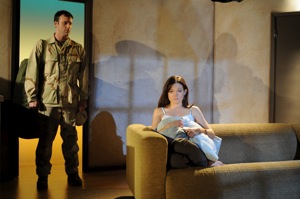-
- Pittsburgh diocese votes to break from Episcopal Church over gay rights
- Arizona marriage ban advocates vastly out-fundraise opposition
- Gay Pennsylvania man claims gender discrimination in suit
- Study traces AIDS virus origins to 100 years ago
- Protesting pastors back candidates from the pulpit
- Activists cry foul at appointment of anti-gay former general at IU
- National News Briefs
- World News Briefs
Theater
Girls, girls, girls … and family violence
Published Thursday, 09-Oct-2008 in issue 1085
Maybe there’s something wrong with me, but it’s difficult for me to work up much interest in who’s sleeping with whose husband, especially in these days of real problems like economic meltdown and political terrorism.
But it must be me, because Clare Boothe Luce’s 1936 play chalked up 657 performances on Broadway and became a classic film in 1939. Its inferior remake has recently been released. The play is on the boards through Oct. 26 at the Old Globe Theatre. Darko Tresnjak directs.
Inspired by a conversation overheard in the ladies’ room at the Morocco Club, The Women exposes the vapid lives of leisure class women who spend their lives having their nails and hair done, shopping and gossiping about their friends.
The plot, hinging on the philandering of Stephen Haines with shopgirl Crystal Allen (Kathleen McElfresh), is really just an excuse to watch female catfights (mostly verbal) and expose the viciousness of “friendship” among the leisure class. How and when should they tell wife Mary (Kate Baldwin)? My question is, who cares?
Luce has created a collection of interesting characters, from poison-tongued gossip Sylvia Fowler (Heather Ayers) to writer Nancy Blake (“I’d rather face a tiger any day than what the critics said about your last book,” snarks Sylvia) to pregnant (again) Edith Potter (Amy Hohn) and innocent bride-to-be Peggy Day (Amanda Kramer).
All of them are spectacularly dressed (kudos to costume designer Anna Oliver) and coiffed, thanks to Michael’s, the salon where dirt is dished while hair is styled and nails polished.
Luce knew what she was talking about. As editor, playwright, social activist, congressmember, journalist and ambassador, and also married to the founder of Time magazine, she traveled in those circles.
Social comment is here in the persons of minor working-class characters such as cook Maggie, a Reno maid and two women from Stephen’s office (“A lot of independence you have on a woman’s wages,” one complains), but the commentary gets lost among all those fancy women in gorgeous costumes and their snarky comments.
For my money, The Women is merely an upper-class soap opera, though admittedly a lavishly stylish one given a beautiful production. David Gordon’s set design is a marvel; Anne Oliver’s costumes to die for; the lighting and sound design impeccable.
Most of the large all-female cast is new to the Globe; all are excellent. The addition of a period song at the top of each act (sung by Nancy Anderson) is a nice touch.
This seems to be the year of the woman in theater: Fat Pig, 9 to 5, The Good Body and now The Women. Go. Enjoy.
The Women plays through Oct. 26 at the Old Globe Theatre. Shows Sunday, Tuesday and Wednesday at 7 p.m.; Thursday through Saturday at 8 p.m; matinees Saturday and Sunday at 2 p.m. For more information, visit www.gaylesbiantimes.com/links/1085.
A tongue-tied princess, pining for the prince she can’t have, deals with a witch who may have the solution. A middle-aged female screenwriter needs that one great script to get her back on top. A scientist wonders where she went wrong in that cloning experiment that left her creation, Zygote, with seven nipples, and then has to deal with a mobster mom who wants a clone of her own.
Three loosely (very loosely) interconnected stories by drag queen Charles Busch meet in the world premiere of The Third Story, playing through Oct. 19 at La Jolla Playhouse’s Potiker Theatre.
The Tony-nominated Busch, probably best known for the plays (later films) Die, Mommie, Die! and Psycho Beach Party, seems to have tossed the elements of this tripartite piece into the air and let them fall where they may. He then tried to solve the continuity issue with overlapping scrims and a script that, well, exhausts and leaves the audience to fend for itself.
It’s an odd piece, to say the least, one perhaps best experienced after a stiff drink or two to loosen the brain cells and assure them that logic isn’t always required. Some in my audience elected not to deal with it and left at intermission, certainly a reasonable response.
But for those who hang in, there are some rewards. Film fans will dig the parody of mob movies. Fantasy fans may smile at the twist Busch brings to the witch Baba Yaga. And writers will identify with the writer’s block experienced by middle-aged Peg (Mary Beth Peil), who wants desperately to come up with that one great script. In fact, The Third Story looks and sounds more like a film than a play.
There’s a good cast here. Scott Parkinson brings a sort of Igor flavor to the seven-nippled Zygote; Jonathan Walker is great as Drew, Peg’s son and unwilling writing partner, and as mobster Steve. Rebecca Lawrence is fine as Princess Vasalisa, Steve’s girlfriend Verna and autocratic sixth-grade teacher Miss Tinsley. Busch plays the witch Baba Yaga and mob mob Queenie Bartlett with equal gusto. But Jennifer Van Dyck is the standout out as researcher Dr. Constance Hudson.
Somewhere, in all this rushing around, is a message about mothers and children, and the need for mothers to let go. Though it’s reiterated several times, it’s easy to lose sight of it (so to speak) in all the visual craziness.
But the bottom line is that this Busch silliness might work as a film, but needs work if it wants to be a play.
The Third Story plays through Oct. 19 at La Jolla Playhouse’s Sheila and Hughes Potiker Theatre. Shows Tuesday and Wednesday at 7:30 p.m.; Thursday through Saturday at 8 p.m.; Sunday at 7 p.m.; matinees Saturday and Sunday at 2 p.m. For more information, visit www.gaylesbiantimes.com/links/1085.
Kelly (Christy Yael) sits on the couch sorting and boxing books for a move. An episode of “Law and Order” plays on TV, and the logic of the show – where the perp is caught and prosecuted, nice and neat, in each one-hour episode – seems to comfort her.
Psychotherapist Kelly’s life knows no such order. In fact, it was upended about a year ago by notification that husband Craig (Sean Cox) died in Baghdad – of an “accidental” self-inflicted gunshot wound.
Kelly’s reverie is interrupted by an uninvited and unwanted visitor – brother-in-law Peter (also played by Cox), who always knows the wrong thing to say and the buttons to push to create turmoil. Kelly reluctantly lets him in, setting up the plot which alternates in time between July 2005 and the night before Craig’s deployment some 18 months earlier. Shifts are indicated by a quarterly turn of the set.
The West Coast premiere of Christopher Shinn’s Dying City plays through Oct. 26 at Cygnet Theatre Rolando. Francis Gercke directs.
Though Dying City features a soldier who served in Baghdad, the play is not about that war. It’s about the insidious war waged with words and emotional subterfuge that has poisoned this family.
They start right out: Kelly lies and says she meant to call, and that she’s just organizing, not moving. Peter wants to talk about his walk-out during the intermission of Long Day’s Journey Into Night, in which he is acting, because of an anti-gay slur by his co-star. But he can’t resist mentioning his difficulty in believing the official report of Craig’s death as accidental, given the extensive training their father gave them in handling weapons. He also comes bearing a sheaf of e-mails from Craig he’s been wanting to “share” with Kelly.
When Cox as Peter goes into the bedroom to make a phone call, he returns 18 months earlier as Craig, the ramrod-straight soldier with opinions to match, who cannot understand Kelly’s profession (people don’t want to change; they just want “to see how much they can get away with,” he opines).
Dying City (the title refers to Baghdad, but could probably just as equally apply to your city) is emotionally as taut as they come, and a tour de force for Cox, who changes characters (utterly convincingly) every time he walks through a door.
Yael is equally excellent as Kelly, whose psyche is every bit as broken as those she sees every day at work.
You’ll walk out with questions: Is Peter Craig’s alter ego? Is Kelly angry with Peter for inflicting the same type of emotional violence she and Craig have engaged in?
There’s a saying that what doesn’t kill you makes you strong. Shinn may be saying that sometimes it just leaves you emotionally maimed.
Dying City plays through Oct. 26 at Cygnet Theatre Rolando. Shows Wednesday at 7:30 p.m.; Thursday through Saturday at 8 p.m.; Sunday at 2 and 7 p.m. For more information, visit www.gaylesbiantimes.com/links/1085.
|
|
Copyright © 2003-2025 Uptown Publications




